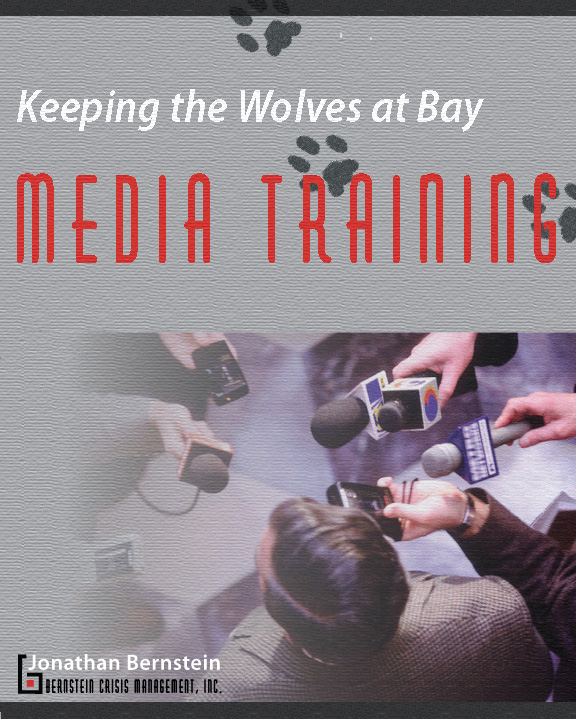JUST A THOUGHT | |
Reality is that which, when you stop believing in it, doesn't go away.
Philip K. Dick |
|
FROM THE EDITOR
I've been a fan of repeat ezine contributor Karen Friedman for years. Her insights about the world of superior corporate communications are epitomized by her latest book, SHUT UP and Say Something, excerpted below.
Then, we get the pleasure of reading crisis management consultant Mike Nayor's thoughtful analysis of Verizon's latest crisis management gaffe. They should have hired him -- or me!
If you want more than just the education offered by this ezine, please consider browsing the Bernstein Crisis Management blog
I manage with my son Erik and the Crisis Management blog I host over at Carter McNamara's Free Management Library.
As always, if you like what you see, please share it with others by using the "Forward Email" link at the bottom of the ezine and tell them to subscribe! IMPORTANT NOTE: If you just "Forward" using your own email program's "Forward" function and your recipient thinks they're being spammed, they can click on the Opt Out link and opt YOU off the list. So use the "Forward Email" link, please.

My best to all,
Jonathan
|
REALITY CHECK
An Excerpt from SHUT UP and Say Something
By Karen Friedman
Reality check shows readers how to tell people what they need to know even if it's not what they want to hear and even if the listener is a boss or someone influential who could affect your  | | Karen Friedman |
career. Drawing on sessions with executives who frequently complain they are surrounded with "yes men", the chapter presents a series of reality check communication techniques to walk readers through how to create trust by addressing problems head on. Through personal experiences, case studies and observations from these specific situations, readers will learn how to apply reality check points in their own business interactions.
To take your own reality check, ask the following questions:
1. What do I want people to know?
2. What are the facts as opposed to rumors or perceived facts?
3. What do people think they know that they aren't discussing?
4. Would the health, safety or well being of anyone be jeopardized if I don't communicate what I know?
5. What do we know or feel that we're not discussing?
6. Are the real issues on the table?
7. Why am I afraid to say what I really think?
8. Am I taking this too personally?
9. What is the possible outcome if I don't reveal certain information?
10. Am I just being polite because I don't want to offend or look foolish?
11. What's the worst that can happen if I have this difficult conversation?
12. Could my real feelings change the course of action?
13. Will my actions compromise trust, credibility or my reputation?
14. Am I able to take responsibility without blaming others?
15. Am I hiding anything?
16. What is the right thing to do?
17. If I were my listener, what would I want see happen?
Being straight with people is probably more important than it's ever been. Thanks to an insatiable demand for information and such ease at instantly sharing that information with people across the globe, I believe the average citizen has forced big business to change. Information such as compensation that was once private is now public. For many companies, the days of lavish golf outings and pricey gifts to prospects are over. People can spot spin almost quickly as Philadelphia Phillies shortstop Jimmy Rollins can steal a base. Inability to recognize and accept this can spell the difference between success and failure.
Be honest with yourself if you want to tell the truth to others.
Karen Friedman is the author of SHUT UP and Say Something: Business Communication Strategies to Overcome Challenges and Influence Listeners (Praeger 2010) and the co-author of Speaking of Success: World Class Experts Share Their Secrets. President of Karen Friedman Enterprises, Inc., her techniques to help business professionals become more powerful persuasive communicators have been applied on four continents. A professional communication coach and speaker, she was formerly an award-winning television news reporter and a political candidate. She can be reached at 610-292-9780 or by visiting www.karenfriedman.com | |
VERIZON: FACING A CRISIS OR A COST OF DOING BUSINESS?
By Michael A. Nayor | A Company admits that it erroneously charged millions of customers for services they never ordered or used. The Company plans to credit current customers and refund former customers to
 | | Michael A. Nayor |
the tune of anywhere from $30 million to $90 million in total. Most companies would consider this a crisis,especially since the regulatory commission with jurisdiction over it says it hasn't finished with these guys.
Well, not so fast. The Company had been notified at least two years ago that they were overcharging, and did nothing about it. After all, customer service is expensive. Why dig into this messy situation if by ignoring it, customers might give up and go away. The loss to an individual consumer may be a pittance, but the possible refunds may be huge, hereby justifying the gamble that the situation won't come to light. Even if the Company is caught, things like this happen all the time. The adverse publicity, if there is any, will blow over, and this is a business risk the Company is willing to take.
The Company in this case is Verizon. The Federal Communications Commission continues its investigation and may start a formal proceeding. But Verizon may have already calculated this into the bottom line cost. More and more U.S. companies are consciously deciding to take on bigger and bigger risks. Stated another way, more and more companies are deciding to be dishonest, whether by design or by simply ignoring facts. Some start out to cheat - inferior raw materials, child labor, the list is endless. Others don't set out to be dishonest but decide not to correct mistakes because of the expense. In today's environment most companies feel they can weather the storm.
It is difficult not to read or hear news almost daily about companies getting caught with their hands in the cookie jar one way or another. The stories are not the exception but are beginning to constitute business as usual and most people really don't care unless they are directly involved. Have we come to the point that American business is expected to be dishonest? Is bad behavior so common that a case like Verizon's doesn't get a second glance? Are responsible decisions being replaced by risk analysis? And is crisis management being relied on to merely cover one's tracks?
Let's revert to the good old days when companies tried to do what was right most of the time, and crisis management was a tool relied on to protect and respond to the public interest, as well as enhance and protect reputations.
Michael Nayor is founder and CEO of The Rhodell Group, LLC, a consulting firm that provides comprehensive crisis management services. He has taught economics at Fairfield University, has written on transfers of privately-held businesses, and has held a variety of community and state elected and appointed positions. He is a graduate of Cornell University (B.S., M.B.A.), New York University School Of Law (J.D.) and the State Department's Foreign Service Institute Advanced Program In Economics. He can be reached at [email protected].
|
BUSINESS ANNOUNCEMENTS
(aka blatant self-promotion)
Keeping the Wolves at Bay: Media Training What has 80+ pages of hard-hitting, entertaining and easy-to-read guidance on how to deal with both traditional and online media during times of crisis? The answer is
Keeping the Wolves at Bay - Media Training. The, four-color, perfect-bound, 8x10 manual is currently available both in hardcopy ($25) and PDF form ($10). Volume discounts are available; write to Jonathan Bernstein for that information.
Here's a couple of teaser reviews for you: Jonathan Bernstein's Keeping the Wolves at Bay is an eminently practical guidance for anyone - business leader, celebrity, politician - who must willingly or unwillingly face the glare of media attention. It appears
at a moment in time when the social media and other digital communications have upped the ante exponentially.
Bernstein's practicum on media relations takes on renewed urgency as news, gossip, and opinion now drive
public perception virally and at the speed of light.
Richard Levick, Esq.
President & CEO
Levick Strategic Communications, LLC
Even if you think you'll never, ever be interviewed by the media, buy this book and read it cover to cover. It isn't a substitute for media training. But it will give you the tools and confidence to go head to head -- and possibly even defang -- rabid reporters, blood-thirsty bloggers and social networking buffoons who are out to besmirch your good name. Joan Stewart, The Publicity Hound
The book and other products can be found at the Crisis Manager Bookstore
Want To Blog And Tweet About
Your Organization But Don't Have Time?
Missing out on all the promotional and SEO advantages of doing so? Hire someone to be your voice...like Erik Bernstein, aka "Son of Crisis Manager."
More info:[email protected]. The Art of Celeste Mendelsohn 
This has NOTHING to do with crisis management, but I have to brag on the launch of the new website launched to feature the art of Celeste Mendelsohn -- my wife, partner and Creative Director. This image is Yin-Yang, painted on a wood round. Her work also includes plates, masks, yoga asanas, computer art and even needlework.
|
GUEST AUTHORS
GUEST AUTHORS are very welcome
to submit material for "Crisis Manager." There is no fee paid, but most
guest authors have reported receiving business inquiries as a result of
appearing in this publication. Case histories, experience-based
lessons, commentary on current news events and editorial opinion are
all eligible for consideration. Submission is not a guarantee of
acceptance.
|
|
ABOUT THE EDITOR & PUBLISHER
Jonathan Bernstein is president of Bernstein Crisis M anagement, Inc., a national crisis management public relations agency providing 24/7 access to crisis response professionals. The agency engages in the full spectrum of crisis management services: crisis prevention, response, planning & training. He has been in the public relations field since 1982, following five-year stints in both military intelligence and investigative reporting. Write to [email protected]. anagement, Inc., a national crisis management public relations agency providing 24/7 access to crisis response professionals. The agency engages in the full spectrum of crisis management services: crisis prevention, response, planning & training. He has been in the public relations field since 1982, following five-year stints in both military intelligence and investigative reporting. Write to [email protected].
|
|
LEGAL DISCLAIMERAll information contained herein is obtained by Jonathan Bernstein from sources believed by Jonathan Bernstein to be accurate and reliable. Because of the possibility of human and mechanical error as well as other factors, neither Jonathan Bernstein nor Bernstein Crisis Management is responsible for any errors or omissions. All information is provided "as is" without warranty of any kind. Bernstein Crisis Management and Jonathan Bernstein make no representations and disclaim all express, implied, and statutory warranties of any kind to the user and/or any third party including, without limitation, warranties as to accuracy, timeliness, completeness, merchantability, or fitness for any particular purpose.
Unless due to willful tortuous misconduct or gross negligence, Jonathan Bernstein and Bernstein Crisis Management shall have no liability in tort, contract, or otherwise (and as permitted by law, product liability), to the user and/or any third party.
Under no circumstance shall Bernstein Crisis Management or Jonathan Bernstein be liable to the user and/or any third party for any lost profits or lost opportunity, indirect, special, consequential, incidental, or punitive damages whatsoever, even if Bernstein Crisis Management or Jonathan Bernstein has been advised of the possibility of such damages.
A service of this newsletter is to provide news summaries and/or snippets to readers. In such instances articles and/or snippets will be reprinted as they are received from the originating party or as they are displayed on the originating website or in the original article. As we do not write the news, we merely point readers to it, under no circumstance shall Bernstein Crisis Management or Jonathan Bernstein be liable to the user and/or any third party for any lost profits or lost opportunity, indirect, special, consequential, incidental, or punitive damages whatsoever due to the distribution of said news articles or snippets that lead readers to a full article on a news service's website, even if Bernstein Crisis Management or Jonathan Bernstein has been advised of the possibility of such damages. Authors of the original news story and their publications shall be exclusively held liable. Any corrections to news stories are not mandatory and shall be printed at the discretion of the list moderator after evaluation on a case-by-case basis.
|
|
|
|